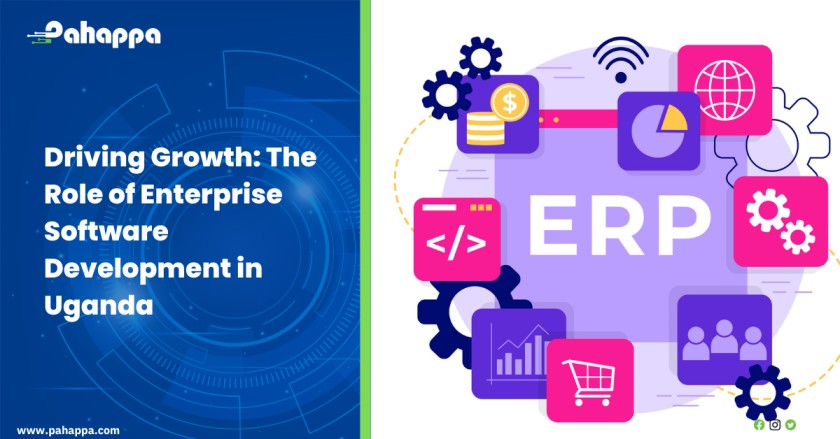Uganda is a rapidly growing economy with a young and tech-savvy population. This makes it an ideal market for enterprise software development, which can help businesses of all sizes to automate their processes, improve efficiency, and reach new customers. In this article, we will explore the role of enterprise software development in driving growth in Uganda. We discuss the benefits of enterprise software for businesses of all sizes, and we will highlight some of the key trends in the Ugandan enterprise software development market.
What is Enterprise Software Development?
Enterprise software development is the process of creating software applications for businesses and organizations. Enterprise software is typically designed to automate and streamline business processes, improve efficiency, and support the organization’s goals.
Examples of enterprise software include:
- Inventory management system: This type of software is used to track and manage inventory levels. It can help organizations to ensure that they have enough inventory to meet demand, while also avoiding overstocking.
- HRMIS: This type of software is used to manage human resources activities, such as employee records, payroll, and benefits. It can help organizations to improve the efficiency of their HR processes and to make better decisions about their workforce.
- M&E: This type of software is used to monitor and evaluate programs and projects. It can help organizations track their progress toward their goals and identify areas where they need to improve.
- Finance management system: This type of software is used to track and manage financial data, such as accounts payable, accounts receivable, and budgeting. It can help organizations to improve their financial reporting and to make better financial decisions.
- CRM: This type of software is used to manage customer relationships. It can help organizations track customer interactions, identify potential leads, and close deals.
Benefits of Enterprise Software Development for businesses in Uganda
- Improved efficiency and productivity
Enterprise software can help businesses automate their core business processes, such as accounting, inventory management, and customer relationship management. This can lead to significant improvements in efficiency and productivity, freeing up employees to focus on more strategic tasks.
- Reduced costs
Enterprise software can help businesses to reduce their costs by automating tasks, reducing errors, and improving visibility into operations. For example, enterprise resource planning (ERP) software can help businesses streamline their supply chains and reduce inventory costs.
- Improved decision-making
Enterprise software can provide businesses with data-driven insights that can help them make better decisions. For example, business intelligence (BI) software can help businesses analyze their sales data to identify trends and opportunities.
- Increased competitiveness
Enterprise software can help businesses become more competitive by giving them the tools and resources they need to improve their products and services and to reach new customers and markets. For example, e-commerce platforms can help businesses sell their products and services to a global audience.
- Improved customer service
Enterprise software can help businesses improve their customer service by providing them with the tools and resources they need to better understand and meet the needs of their customers. For example, customer relationship management (CRM) software can help businesses track customer interactions, identify potential problems, and resolve issues quickly and efficiently.
- Enhanced security
Enterprise software can help businesses enhance their security by providing them with features such as data encryption, access control, and intrusion detection. This is especially important for businesses in Uganda, which is facing a growing threat of cyberattacks.
- Increased innovation
Enterprise software can help businesses increase innovation by providing them with the tools and resources they need to develop new products and services and to improve existing ones. For example, business intelligence (BI) software can help businesses to identify trends and opportunities in their markets.
- Improved collaboration
Enterprise software can help businesses improve collaboration by providing them with tools such as document sharing, communication platforms, and project management tools. This can help businesses to work more efficiently and effectively, especially when employees are located in different parts of the country or the world.
Key trends in the Ugandan enterprise software development market.
- Cloud computing
Cloud computing is a service that provides on-demand access to computing resources, such as servers, storage, databases, networking, software, analytics, and intelligence. It offers a number of advantages for businesses, including:
- Scalability: Cloud computing resources can be scaled up or down quickly and easily to meet changing demands. This can be especially beneficial for businesses with fluctuating demand or seasonal spikes.
- Flexibility: Cloud computing offers businesses a great deal of flexibility in how they deploy and manage their applications and data. Businesses can choose from a variety of cloud computing services, such as infrastructure as a service (IaaS), platform as a service (PaaS), and software as a service (SaaS).
- Cost savings: Cloud computing can help businesses to save money on IT costs, such as hardware, software, and maintenance costs. Businesses typically pay for cloud computing resources on a pay-as-you-go basis, which can help to reduce upfront costs.
- Mobile computing
Mobile computing is the use of portable devices, such as smartphones and tablets, to access and process information. Mobile computing is becoming increasingly popular in Uganda, as smartphones and tablets are becoming more affordable and accessible. This is creating a growing demand for enterprise software solutions that are mobile-friendly.
Mobile-friendly enterprise software solutions can help businesses to improve their productivity and efficiency by allowing employees to access and work on business data and applications from anywhere, anytime. Mobile-friendly enterprise software solutions can also help businesses to reach new customers and markets by providing them with a way to interact with businesses on the go.
- Big data and analytics
Big data refers to datasets that are so large or complex that they cannot be processed using traditional data processing applications. Big data and analytics can help businesses to make better decisions based on data-driven insights.
Enterprise software solutions can help businesses to collect, store, and analyze big data. This can help businesses identify trends, patterns, and opportunities that would be difficult or impossible to identify using traditional data processing methods. Big data and analytics can also help businesses to improve their operational efficiency, reduce costs, and increase revenue.
- Artificial intelligence and machine learning
Artificial intelligence (AI) and machine learning (ML) are emerging technologies that are having a significant impact on the enterprise software development industry. AI and ML can be used to automate tasks, improve decision-making, and create new products and services.
Enterprise software solutions can incorporate AI and ML to automate tasks, such as customer service, data entry, and fraud detection. AI and ML can also be used to improve decision-making, such as providing recommendations to customers and forecasting demand. Additionally, AI and ML can be used to create new products and services, such as chatbots and virtual assistants.
- Block chain
Blockchain is a distributed ledger technology that can be used to create secure and tamper-proof transactions. Blockchain is having a significant impact on the enterprise software development industry, as it can be used for a variety of business applications, such as supply chain management, payments, and identity management.
Enterprise software solutions can incorporate blockchain to create secure and tamper-proof transactions. This can be especially beneficial for businesses that need to process sensitive data or that need to ensure the integrity of their data.
In conclusion, the Ugandan enterprise software development market is a rapidly growing market with a number of trends driving its growth. Businesses in Uganda that are looking to improve their efficiency, productivity, competitiveness, and profitability should consider investing in enterprise software development. If you are interested in learning more about our enterprise software development services, please contact us today. We would be happy to discuss your specific needs and help you find the right solution for your business.











